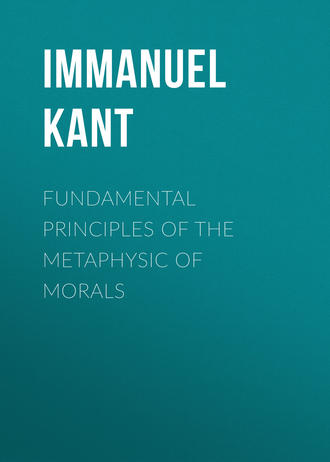 полная версия
полная версияFundamental Principles of the Metaphysic of Morals
What then is it which justifies virtue or the morally good disposition, in making such lofty claims? It is nothing less than the privilege it secures to the rational being of participating in the giving of universal laws, by which it qualifies him to be a member of a possible kingdom of ends, a privilege to which he was already destined by his own nature as being an end in himself and, on that account, legislating in the kingdom of ends; free as regards all laws of physical nature, and obeying those only which he himself gives, and by which his maxims can belong to a system of universal law, to which at the same time he submits himself. For nothing has any worth except what the law assigns it. Now the legislation itself which assigns the worth of everything must for that very reason possess dignity, that is an unconditional incomparable worth; and the word respect alone supplies a becoming expression for the esteem which a rational being must have for it. Autonomy then is the basis of the dignity of human and of every rational nature.
The three modes of presenting the principle of morality that have been adduced are at bottom only so many formulae of the very same law, and each of itself involves the other two. There is, however, a difference in them, but it is rather subjectively than objectively practical, intended namely to bring an idea of the reason nearer to intuition (by means of a certain analogy) and thereby nearer to feeling. All maxims, in fact, have:
1. A form, consisting in universality; and in this view the formula of the moral imperative is expressed thus, that the maxims must be so chosen as if they were to serve as universal laws of nature.
2. A matter, namely, an end, and here the formula says that the rational being, as it is an end by its own nature and therefore an end in itself, must in every maxim serve as the condition limiting all merely relative and arbitrary ends.
3. A complete characterization of all maxims by means of that formula, namely, that all maxims ought by their own legislation to harmonize with a possible kingdom of ends as with a kingdom of nature. 15 There is a progress here in the order of the categories of unity of the form of the will (its universality), plurality of the matter (the objects, i.e., the ends), and totality of the system of these. In forming our moral judgement of actions, it is better to proceed always on the strict method and start from the general formula of the categorical imperative: Act according to a maxim which can at the same time make itself a universal law. If, however, we wish to gain an entrance for the moral law, it is very useful to bring one and the same action under the three specified conceptions, and thereby as far as possible to bring it nearer to intuition.
We can now end where we started at the beginning, namely, with the conception of a will unconditionally good. That will is absolutely good which cannot be evil- in other words, whose maxim, if made a universal law, could never contradict itself. This principle, then, is its supreme law: "Act always on such a maxim as thou canst at the same time will to be a universal law"; this is the sole condition under which a will can never contradict itself; and such an imperative is categorical. Since the validity of the will as a universal law for possible actions is analogous to the universal connexion of the existence of things by general laws, which is the formal notion of nature in general, the categorical imperative can also be expressed thus: Act on maxims which can at the same time have for their object themselves as universal laws of nature. Such then is the formula of an absolutely good will.
Rational nature is distinguished from the rest of nature by this, that it sets before itself an end. This end would be the matter of every good will. But since in the idea of a will that is absolutely good without being limited by any condition (of attaining this or that end) we must abstract wholly from every end to be effected (since this would make every will only relatively good), it follows that in this case the end must be conceived, not as an end to be effected, but as an independently existing end. Consequently it is conceived only negatively, i.e., as that which we must never act against and which, therefore, must never be regarded merely as means, but must in every volition be esteemed as an end likewise. Now this end can be nothing but the subject of all possible ends, since this is also the subject of a possible absolutely good will; for such a will cannot without contradiction be postponed to any other object. The principle: "So act in regard to every rational being (thyself and others), that he may always have place in thy maxim as an end in himself," is accordingly essentially identical with this other: "Act upon a maxim which, at the same time, involves its own universal validity for every rational being." For that in using means for every end I should limit my maxim by the condition of its holding good as a law for every subject, this comes to the same thing as that the fundamental principle of all maxims of action must be that the subject of all ends, i.e., the rational being himself, be never employed merely as means, but as the supreme condition restricting the use of all means, that is in every case as an end likewise.
It follows incontestably that, to whatever laws any rational being may be subject, he being an end in himself must be able to regard himself as also legislating universally in respect of these same laws, since it is just this fitness of his maxims for universal legislation that distinguishes him as an end in himself; also it follows that this implies his dignity (prerogative) above all mere physical beings, that he must always take his maxims from the point of view which regards himself and, likewise, every other rational being as law-giving beings (on which account they are called persons). In this way a world of rational beings (mundus intelligibilis) is possible as a kingdom of ends, and this by virtue of the legislation proper to all persons as members. Therefore every rational being must so act as if he were by his maxims in every case a legislating member in the universal kingdom of ends. The formal principle of these maxims is: "So act as if thy maxim were to serve likewise as the universal law (of all rational beings)." A kingdom of ends is thus only possible on the analogy of a kingdom of nature, the former however only by maxims, that is self-imposed rules, the latter only by the laws of efficient causes acting under necessitation from without. Nevertheless, although the system of nature is looked upon as a machine, yet so far as it has reference to rational beings as its ends, it is given on this account the name of a kingdom of nature. Now such a kingdom of ends would be actually realized by means of maxims conforming to the canon which the categorical imperative prescribes to all rational beings, if they were universally followed. But although a rational being, even if he punctually follows this maxim himself, cannot reckon upon all others being therefore true to the same, nor expect that the kingdom of nature and its orderly arrangements shall be in harmony with him as a fitting member, so as to form a kingdom of ends to which he himself contributes, that is to say, that it shall favour his expectation of happiness, still that law: "Act according to the maxims of a member of a merely possible kingdom of ends legislating in it universally," remains in its full force, inasmuch as it commands categorically. And it is just in this that the paradox lies; that the mere dignity of man as a rational creature, without any other end or advantage to be attained thereby, in other words, respect for a mere idea, should yet serve as an inflexible precept of the will, and that it is precisely in this independence of the maxim on all such springs of action that its sublimity consists; and it is this that makes every rational subject worthy to be a legislative member in the kingdom of ends: for otherwise he would have to be conceived only as subject to the physical law of his wants. And although we should suppose the kingdom of nature and the kingdom of ends to be united under one sovereign, so that the latter kingdom thereby ceased to be a mere idea and acquired true reality, then it would no doubt gain the accession of a strong spring, but by no means any increase of its intrinsic worth. For this sole absolute lawgiver must, notwithstanding this, be always conceived as estimating the worth of rational beings only by their disinterested behaviour, as prescribed to themselves from that idea [the dignity of man] alone. The essence of things is not altered by their external relations, and that which, abstracting from these, alone constitutes the absolute worth of man, is also that by which he must be judged, whoever the judge may be, and even by the Supreme Being. Morality, then, is the relation of actions to the relation of actions will, that is, to the autonomy of potential universal legislation by its maxims. An action that is consistent with the autonomy of the will is permitted; one that does not agree therewith is forbidden. A will whose maxims necessarily coincide with the laws of autonomy is a holy will, good absolutely. The dependence of a will not absolutely good on the principle of autonomy (moral necessitation) is obligation. This, then, cannot be applied to a holy being. The objective necessity of actions from obligation is called duty.
From what has just been said, it is easy to see how it happens that, although the conception of duty implies subjection to the law, we yet ascribe a certain dignity and sublimity to the person who fulfils all his duties. There is not, indeed, any sublimity in him, so far as he is subject to the moral law; but inasmuch as in regard to that very law he is likewise a legislator, and on that account alone subject to it, he has sublimity. We have also shown above that neither fear nor inclination, but simply respect for the law, is the spring which can give actions a moral worth. Our own will, so far as we suppose it to act only under the condition that its maxims are potentially universal laws, this ideal will which is possible to us is the proper object of respect; and the dignity of humanity consists just in this capacity of being universally legislative, though with the condition that it is itself subject to this same legislation.
The Autonomy of the Will as the Supreme Principle of Morality
Autonomy of the will is that property of it by which it is a law to itself (independently of any property of the objects of volition). The principle of autonomy then is: "Always so to choose that the same volition shall comprehend the maxims of our choice as a universal law." We cannot prove that this practical rule is an imperative, i.e., that the will of every rational being is necessarily bound to it as a condition, by a mere analysis of the conceptions which occur in it, since it is a synthetical proposition; we must advance beyond the cognition of the objects to a critical examination of the subject, that is, of the pure practical reason, for this synthetic proposition which commands apodeictically must be capable of being cognized wholly a priori. This matter, however, does not belong to the present section. But that the principle of autonomy in question is the sole principle of morals can be readily shown by mere analysis of the conceptions of morality. For by this analysis we find that its principle must be a categorical imperative and that what this commands is neither more nor less than this very autonomy.
Heteronomy of the Will as the Source of all spurious Principles of Morality
If the will seeks the law which is to determine it anywhere else than in the fitness of its maxims to be universal laws of its own dictation, consequently if it goes out of itself and seeks this law in the character of any of its objects, there always results heteronomy. The will in that case does not give itself the law, but it is given by the object through its relation to the will. This relation, whether it rests on inclination or on conceptions of reason, only admits of hypothetical imperatives: "I ought to do something because I wish for something else." On the contrary, the moral, and therefore categorical, imperative says: "I ought to do so and so, even though I should not wish for anything else." E.g., the former says: "I ought not to lie, if I would retain my reputation"; the latter says: "I ought not to lie, although it should not bring me the least discredit." The latter therefore must so far abstract from all objects that they shall have no influence on the will, in order that practical reason (will) may not be restricted to administering an interest not belonging to it, but may simply show its own commanding authority as the supreme legislation. Thus, e.g., I ought to endeavour to promote the happiness of others, not as if its realization involved any concern of mine (whether by immediate inclination or by any satisfaction indirectly gained through reason), but simply because a maxim which excludes it cannot be comprehended as a universal law in one and the same volition.
Classification of all Principles of Morality which can be founded on the Conception of Heteronomy
Here as elsewhere human reason in its pure use, so long as it was not critically examined, has first tried all possible wrong ways before it succeeded in finding the one true way.
All principles which can be taken from this point of view are either empirical or rational. The former, drawn from the principle of happiness, are built on physical or moral feelings; the latter, drawn from the principle of perfection, are built either on the rational conception of perfection as a possible effect, or on that of an independent perfection (the will of God) as the determining cause of our will.
Empirical principles are wholly incapable of serving as a foundation for moral laws. For the universality with which these should hold for all rational beings without distinction, the unconditional practical necessity which is thereby imposed on them, is lost when their foundation is taken from the particular constitution of human nature, or the accidental circumstances in which it is placed. The principle of private happiness, however, is the most objectionable, not merely because it is false, and experience contradicts the supposition that prosperity is always proportioned to good conduct, nor yet merely because it contributes nothing to the establishment of morality- since it is quite a different thing to make a prosperous man and a good man, or to make one prudent and sharp-sighted for his own interests and to make him virtuous- but because the springs it provides for morality are such as rather undermine it and destroy its sublimity, since they put the motives to virtue and to vice in the same class and only teach us to make a better calculation, the specific difference between virtue and vice being entirely extinguished. On the other hand, as to moral feeling, this supposed special sense, 16 the appeal to it is indeed superficial when those who cannot think believe that feeling will help them out, even in what concerns general laws: and besides, feelings, which naturally differ infinitely in degree, cannot furnish a uniform standard of good and evil, nor has anyone a right to form judgements for others by his own feelings: nevertheless this moral feeling is nearer to morality and its dignity in this respect, that it pays virtue the honour of ascribing to her immediately the satisfaction and esteem we have for her and does not, as it were, tell her to her face that we are not attached to her by her beauty but by profit.
Amongst the rational principles of morality, the ontological conception of perfection, notwithstanding its defects, is better than the theological conception which derives morality from a Divine absolutely perfect will. The former is, no doubt, empty and indefinite and consequently useless for finding in the boundless field of possible reality the greatest amount suitable for us; moreover, in attempting to distinguish specifically the reality of which we are now speaking from every other, it inevitably tends to turn in a circle and cannot avoid tacitly presupposing the morality which it is to explain; it is nevertheless preferable to the theological view, first, because we have no intuition of the divine perfection and can only deduce it from our own conceptions, the most important of which is that of morality, and our explanation would thus be involved in a gross circle; and, in the next place, if we avoid this, the only notion of the Divine will remaining to us is a conception made up of the attributes of desire of glory and dominion, combined with the awful conceptions of might and vengeance, and any system of morals erected on this foundation would be directly opposed to morality.
However, if I had to choose between the notion of the moral sense and that of perfection in general (two systems which at least do not weaken morality, although they are totally incapable of serving as its foundation), then I should decide for the latter, because it at least withdraws the decision of the question from the sensibility and brings it to the court of pure reason; and although even here it decides nothing, it at all events preserves the indefinite idea (of a will good in itself free from corruption, until it shall be more precisely defined.
For the rest I think I may be excused here from a detailed refutation of all these doctrines; that would only be superfluous labour, since it is so easy, and is probably so well seen even by those whose office requires them to decide for one of these theories (because their hearers would not tolerate suspension of judgement). But what interests us more here is to know that the prime foundation of morality laid down by all these principles is nothing but heteronomy of the will, and for this reason they must necessarily miss their aim.
In every case where an object of the will has to be supposed, in order that the rule may be prescribed which is to determine the will, there the rule is simply heteronomy; the imperative is conditional, namely, if or because one wishes for this object, one should act so and so: hence it can never command morally, that is, categorically. Whether the object determines the will by means of inclination, as in the principle of private happiness, or by means of reason directed to objects of our possible volition generally, as in the principle of perfection, in either case the will never determines itself immediately by the conception of the action, but only by the influence which the foreseen effect of the action has on the will; I ought to do something, on this account, because I wish for something else; and here there must be yet another law assumed in me as its subject, by which I necessarily will this other thing, and this law again requires an imperative to restrict this maxim. For the influence which the conception of an object within the reach of our faculties can exercise on the will of the subject, in consequence of its natural properties, depends on the nature of the subject, either the sensibility (inclination and taste), or the understanding and reason, the employment of which is by the peculiar constitution of their nature attended with satisfaction. It follows that the law would be, properly speaking, given by nature, and, as such, it must be known and proved by experience and would consequently be contingent and therefore incapable of being an apodeictic practical rule, such as the moral rule must be. Not only so, but it is inevitably only heteronomy; the will does not give itself the law, but is given by a foreign impulse by means of a particular natural constitution of the subject adapted to receive it. An absolutely good will, then, the principle of which must be a categorical imperative, will be indeterminate as regards all objects and will contain merely the form of volition generally, and that as autonomy, that is to say, the capability of the maxims of every good will to make themselves a universal law, is itself the only law which the will of every rational being imposes on itself, without needing to assume any spring or interest as a foundation.
How such a synthetical practical a priori proposition is possible, and why it is necessary, is a problem whose solution does not lie within the bounds of the metaphysic of morals; and we have not here affirmed its truth, much less professed to have a proof of it in our power. We simply showed by the development of the universally received notion of morality that an autonomy of the will is inevitably connected with it, or rather is its foundation. Whoever then holds morality to be anything real, and not a chimerical idea without any truth, must likewise admit the principle of it that is here assigned. This section then, like the first, was merely analytical. Now to prove that morality is no creation of the brain, which it cannot be if the categorical imperative and with it the autonomy of the will is true, and as an a priori principle absolutely necessary, this supposes the possibility of a synthetic use of pure practical reason, which however we cannot venture on without first giving a critical examination of this faculty of reason. In the concluding section we shall give the principal outlines of this critical examination as far as is sufficient for our purpose.
SEC_3
THIRD SECTION
TRANSITION FROM THE METAPHYSIC OF MORALS TO THE CRITIQUE OF PURE PRACTICAL REASON
The Concept of Freedom is the Key that explains the Autonomy of the Will
The will is a kind of causality belonging to living beings in so far as they are rational, and freedom would be this property of such causality that it can be efficient, independently of foreign causes determining it; just as physical necessity is the property that the causality of all irrational beings has of being determined to activity by the influence of foreign causes.
The preceding definition of freedom is negative and therefore unfruitful for the discovery of its essence, but it leads to a positive conception which is so much the more full and fruitful.
Since the conception of causality involves that of laws, according to which, by something that we call cause, something else, namely the effect, must be produced; hence, although freedom is not a property of the will depending on physical laws, yet it is not for that reason lawless; on the contrary it must be a causality acting according to immutable laws, but of a peculiar kind; otherwise a free will would be an absurdity. Physical necessity is a heteronomy of the efficient causes, for every effect is possible only according to this law, that something else determines the efficient cause to exert its causality. What else then can freedom of the will be but autonomy, that is, the property of the will to be a law to itself? But the proposition: "The will is in every action a law to itself," only expresses the principle: "To act on no other maxim than that which can also have as an object itself as a universal law." Now this is precisely the formula of the categorical imperative and is the principle of morality, so that a free will and a will subject to moral laws are one and the same.
On the hypothesis, then, of freedom of the will, morality together with its principle follows from it by mere analysis of the conception. However, the latter is a synthetic proposition; viz., an absolutely good will is that whose maxim can always include itself regarded as a universal law; for this property of its maxim can never be discovered by analysing the conception of an absolutely good will. Now such synthetic propositions are only possible in this way: that the two cognitions are connected together by their union with a third in which they are both to be found. The positive concept of freedom furnishes this third cognition, which cannot, as with physical causes, be the nature of the sensible world (in the concept of which we find conjoined the concept of something in relation as cause to something else as effect). We cannot now at once show what this third is to which freedom points us and of which we have an idea a priori, nor can we make intelligible how the concept of freedom is shown to be legitimate from principles of pure practical reason and with it the possibility of a categorical imperative; but some further preparation is required.
Freedom must be presupposed as a Property of the Will of all Rational Beings
It is not enough to predicate freedom of our own will, from Whatever reason, if we have not sufficient grounds for predicating the same of all rational beings. For as morality serves as a law for us only because we are rational beings, it must also hold for all rational beings; and as it must be deduced simply from the property of freedom, it must be shown that freedom also is a property of all rational beings. It is not enough, then, to prove it from certain supposed experiences of human nature (which indeed is quite impossible, and it can only be shown a priori), but we must show that it belongs to the activity of all rational beings endowed with a will. Now I say every being that cannot act except under the idea of freedom is just for that reason in a practical point of view really free, that is to say, all laws which are inseparably connected with freedom have the same force for him as if his will had been shown to be free in itself by a proof theoretically conclusive. 17 Now I affirm that we must attribute to every rational being which has a will that it has also the idea of freedom and acts entirely under this idea. For in such a being we conceive a reason that is practical, that is, has causality in reference to its objects. Now we cannot possibly conceive a reason consciously receiving a bias from any other quarter with respect to its judgements, for then the subject would ascribe the determination of its judgement not to its own reason, but to an impulse. It must regard itself as the author of its principles independent of foreign influences. Consequently as practical reason or as the will of a rational being it must regard itself as free, that is to say, the will of such a being cannot be a will of its own except under the idea of freedom. This idea must therefore in a practical point of view be ascribed to every rational being.









